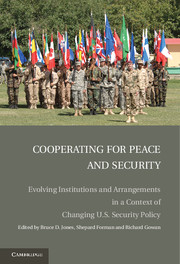 Cooperating for Peace and Security
Cooperating for Peace and Security Foreword
Published online by Cambridge University Press: 22 January 2010
Summary
When I started the Center on International Cooperation (CIC) at New York University in 1996, I was seized by the problem of institutional, financial, and political impasses that precluded more effective multilateral cooperation in the post–Cold War world. From my perch as Director of International Affairs at the Ford Foundation, I had witnessed the failure of many donor governments to meet their international obligations, whether to international aid or to global peace and security. Time and again, the UN, the international humanitarian organizations, the International Court of Justice, and even the U.S. Department of State turned to private philanthropy (and increasingly, to the corporate sector) to seek funding for programs that were not only in the international public realm but basic to it. These programs ranged from humanitarian relief and resettlement efforts in the proliferating civil wars in Africa to clerkships, fact finding and translation at the World Court, and stabilization programs in the former Soviet bloc.
In those promising years between the end of the Cold War and the emergence of the preemptive “take the fight anywhere” Bush doctrine, the possibilities seemed ripe for improved multilateral cooperation to address the issues of poverty reduction, global health, cooperative security, environmental management, the expansion of human rights, and a comprehensive system of international justice. The premise was never a simple “all multilateralism is good,” but an effort to examine deeply the political, financial, institutional, and legal underpinnings of multilateral cooperation to address critical transnational and global problems that no single nation or small grouping of nations could address on their own.
- Type
- Chapter
- Information
- Cooperating for Peace and SecurityEvolving Institutions and Arrangements in a Context of Changing U.S. Security Policy, pp. xiii - xivPublisher: Cambridge University PressPrint publication year: 2009


